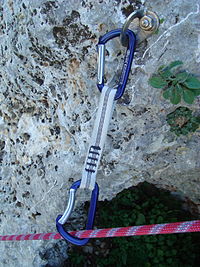
Photo from wikipedia
Abstract Climbers are mobilizing to collectively address challenges associated with their sport. In this paper, we argue that such challenges deserve greater attention, as do climbers’ responses to them. The… Click to show full abstract
Abstract Climbers are mobilizing to collectively address challenges associated with their sport. In this paper, we argue that such challenges deserve greater attention, as do climbers’ responses to them. The argument is illustrated through three challenges: the “classic” self-governance challenge of divergent climber preferences regarding fixed hardware; the “evolving” challenge of attitudes towards acceptable climber behavior, and; the “emerging” challenge of ensuring diversity, inclusion, and representation in this historically white and male activity. We outline a research approach that leverages collaboration with local climbing organizations and present survey data from communities in Colorado (U.S.), Utah (U.S.), and Ontario (Canada). Similar to other outdoor recreation contexts, a better understanding of self-governance challenges is critical for climbers and land managers alike, as both groups seek effective management for the benefit of recreationists and the natural resources themselves.
Journal Title: Journal of outdoor recreation and tourism
Year Published: 2020
Link to full text (if available)
Share on Social Media: Sign Up to like & get
recommendations!